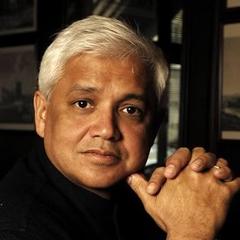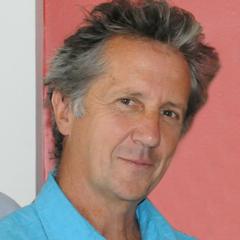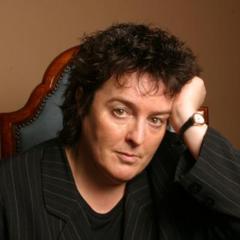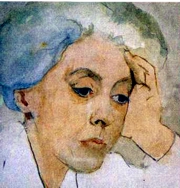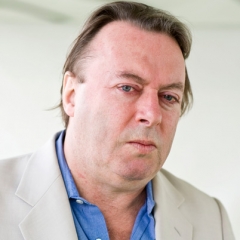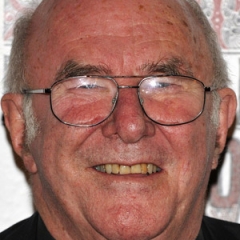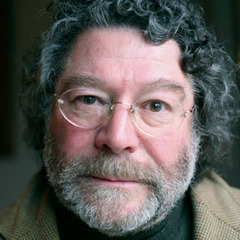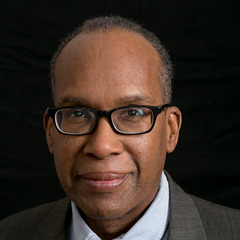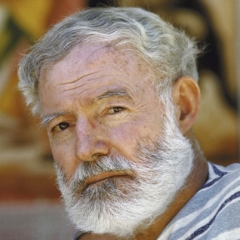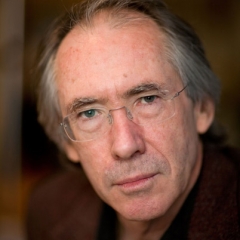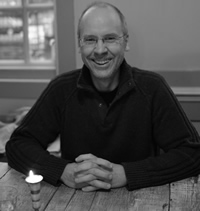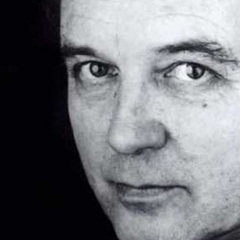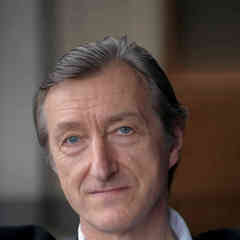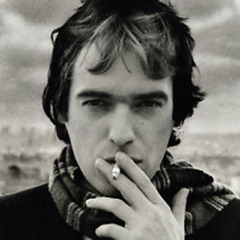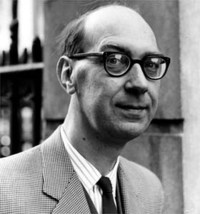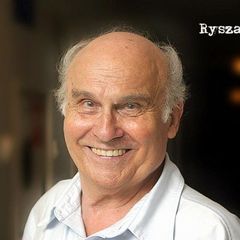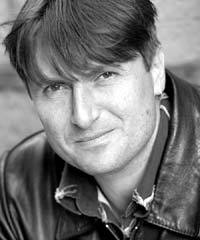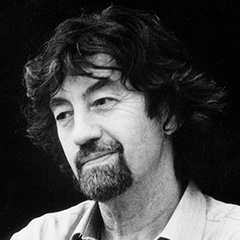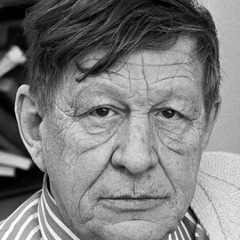James Fenton quotes
-
“Lyric poetry is, of course, musical in origin. I do know that what happened to poetry in the twentieth century was that it began to be written for the page. When it's a question of typography, why not? Poets have done beautiful things with typography - Apollinaire's 'Calligrammes,' that sort of thing.”
-- James Fenton -
“Imitation, if it is not forgery, is a fine thing. It stems from a generous impulse, and a realistic sense of what can and cannot be done.”
-- James FentonSource : The Independent on Sunday, December 16, 1990.
-
“The lullaby is the spell whereby the mother attempts to transform herself back from an ogre to a saint.”
-- James Fenton -
“The writing of a poem is like a child throwing stones into a mineshaft. You compose first, then you listen for the reverberation.”
-- James FentonSource : The Independent on Sunday, June 24, 1990.
-
-
“My feeling is that poetry will wither on the vine if you don't regularly come back to the simplest fundamentals of the poem: rhythm, rhyme, simple subjects - love, death, war.”
-- James Fenton -
“An aria in an opera - Handel's 'Ombra mai fu,' for example - gets along with an incredibly small number of words and ideas and a large amount of variation and repetition. That's the beauty of it. It's not taxing to the listener's intelligence because if you haven't heard it the first time round, it'll come around again.”
-- James Fenton -
“Generally speaking, rhyme is the marker for the end of a line. The first rhyme-word is like a challenge thrown down, which the poem itself has to respond to.”
-- James FentonSource : "Slave to the rhythm" by James Fenton, www.theguardian.com. October 26, 2002.

-
“Hearing that the same men who brought us 'South Park' were mounting a musical to be called 'The Book of Mormon,' we were tempted to turn away, as from an inevitable massacre.”
-- James Fenton -
-
“I've not been a prolific poet, and it always seemed to me to be a bad idea to feel that you had to produce in order to get... credits. Production of a collection of poems every three years or every five years, or whatever, looks good, on paper. But it might not be good; it might be writing on a kind of automatic pilot.”
-- James Fenton -
“'Love' is so short of perfect rhymes that convention allows half-rhymes like 'move.' The alternative is a plague of doves, or a kind of poem in which the poet addresses his adored both as 'love' and as 'guv' - a perfectly decent solution once, but only once, in a while.”
-- James Fenton -
“The basic rhymes in English are masculine, which is to say that the last syllable of the line is stressed: 'lane' rhymes with 'pain,' but it also rhymes with 'urbane' since the last syllable of 'urbane' is stressed. 'Lane' does not rhyme with 'methane.'”
-- James Fenton -
“Some of my educated Filipino friends were aspiring poets, but their aspirations were all in the direction of the United States. They had no desire to learn from the bardic tradition that continued in the barrios. Their ideal would have been to write something that would get them to Iowa, where they would study creative writing.”
-- James Fenton -
-
“Modernism in other arts brought extreme difficulty. In poetry, the characteristic difficulty imported under the name of modernism was obscurity. But obscurity could just as easily be a quality of metrical as of free verse.”
-- James FentonSource : "Negative images" by James Fenton, www.theguardian.com. November 15, 2002.

-
“A poem with grandly conceived and executed stanzas, such as one of Keats's odes, should be like an enfilade of rooms in a palace: one proceeds, with eager anticipation, from room to room.”
-- James FentonSource : "Changing rooms" by James Fenton, www.theguardian.com. September 6, 2002.

-
“A glance at the history of European poetry is enough to inform us that rhyme itself is not indispensable. Latin poetry in the classical age had no use for it, and the kind of Latin poetry that does rhyme - as for instance the medieval 'Carmina Burana' - tends to be somewhat crude stuff in comparison with the classical verse that doesn't.”
-- James Fenton -
“The Mormon mission to Africa, as to other dark-skinned parts of the world, was for a long time hobbled by the racism of the movement's scripture.”
-- James Fenton -
-
“Composers need words, but they do not necessarily need poetry. The Russian composer, Aleksandr Mossolov, who chose texts from newspaper small ads, had a good point to make. With revolutionary music, any text can be set to work.”
-- James Fenton -
“English poetry begins whenever we decide to say the modern English language begins, and it extends as far as we decide to say that the English language extends.”
-- James Fenton -
“At somewhere around 10 syllables, the English poetic line is at its most relaxed and manageable.”
-- James Fenton -
“Great poetry does not have to be technically intricate.”
-- James FentonSource : "To villanelle and back" by James Fenton, www.theguardian.com. October 5, 2002.

-
-
“I don't see that a single line can constitute a stanza, although it can constitute a whole poem.”
-- James FentonSource : "Changing rooms" by James Fenton, www.theguardian.com. September 6, 2002.

-
“I prefer writing in the mornings, so to that extent I have a routine. I do reading and other things in the afternoon.”
-- James Fenton -
“In rap, as in most popular lyrics, a very low standard is set for rhyme; but this was not always the case with popular music.”
-- James FentonSource : "It ain't necessarily so" by James Fenton, www.theguardian.com. October 18, 2002.

-
“Nobody really knows whether they are a poet. I knew I was interested from the age of 15.”
-- James Fenton -
-
“One problem we face comes from the lack of any agreed sense of how we should be working to train ourselves to write poetry.”
-- James FentonSource : "Just keep practising for real" by James Fenton, www.theguardian.com. June 8, 2002.

-
“Poetry carries its history within it, and it is oral in origin. Its transmission was oral.”
-- James FentonSource : "Stamp of the three-footed molossus" by James Fenton, www.theguardian.com. July 19, 2002.

-
“A really interesting and happy time was when I first went to Florence as a student and studied Italian. I was living in a pensione on an allowance of £40 a month, which was princely. I did a lot of work and enjoyed myself immensely.”
-- James Fenton -
-
“At four lines, with the quatrain, we reach the basic stanza form familiar from a whole range of English poetic practice. This is the length of the ballad stanza, the verse of a hymn, and innumerable other kinds of verse.”
-- James Fenton -
“Considering the wealth of poetic drama that has come down to us from the Elizabethan and Jacobean periods, it is surprising that so little of any value has been added since.”
-- James Fenton -
“Oh let us not be condemned for what we are. It is enough to account for what we do.”
-- James FentonSource : 1983 'Children in Exile'.
-
“Windbags can be right. Aphorists can be wrong. It is a tough world.”
-- James FentonSource : The Times, February 21, 1985.
-
-
“Among those today who believe that modern poetry must do without rhyme or metre, there is an assumption that the alternative to free verse is a crash course in villanelles, sestinas and other such fixed forms. But most...are rare in English poetry. Few poets have written a villanelle worth reading, or indeed regret not having done so.”
-- James Fenton -
“It normally happens that if you put two words together, or two syllables together, one of them will attract more weight, more emphasis, than the other. In other words, most so-called spondees can be read as either iambs or trochees.”
-- James Fenton -
“The composer does not want the self-sufficiency of a richly complex text: he or she wants to feel that the text is something in need of musical setting.”
-- James Fenton -
“For poets today or in any age, the choice is not between freedom on the one hand and abstruse French forms on the other. The choice is between the nullity and vanity of our first efforts, and the developing of a sense of idiom, form, structure, metre, rhythm, line - all the fundamental characteristics of this verbal art.”
-- James FentonSource : "An Introduction to English Poetry". Book by James Fenton, www.theguardian.com. June 15, 2002.

-
-
“Free verse seemed democratic because it offered freedom of access to writers. And those who disdained free verse would always be open to accusations of elitism, mandarinism. Open form was like common ground on which all might graze their cattle - it was not to be closed in by usurping landlords.”
-- James FentonSource : "Negative images" by James Fenton, www.theguardian.com. November 15, 2002.

-
“Babies are not brought by storks and poets are not produced by workshops.”
-- James Fenton -
“The voice is raised, and that is where poetry begins. And even today, in the prolonged aftermath of modernism, in places where 'open form' or free verse is the orthodoxy, you will find a memory of that raising of the voice in the term 'heightened speech.'”
-- James Fenton -
“There is no objection to the proposal: in order to learn to be a poet, I shall try to write a sonnet. But the thing you must try to write, when you do so, is a real sonnet, and not a practice sonnet.”
-- James FentonSource : "Just keep practising for real" by James Fenton, www.theguardian.com. June 8, 2002.

-
-
“When we study Shakespeare on the page, for academic purposes, we may require all kinds of help. Generally, we read him in modern spelling and with modern punctuation, and with notes. But any poetry that is performed - from song lyric to tragic speech - must make its point, as it were, without reference back.”
-- James Fenton -
“Writing for the page is only one form of writing for the eye. Wherever solemn inscriptions are put up in public places, there is a sense that the site and the occasion demand a form of writing which goes beyond plain informative prose. Each word is so valued that the letters forming it are seen as objects of solemn beauty.”
-- James FentonSource : "The eyes have it" by James Fenton, www.theguardian.com. November 1, 2002.

-
“Those who actually set out to see the fall of a city or those who choose to go to a front line, are obviously asking themselves to what extent they are cowards. But the tests they set themselves - there is a dead body, can you bear to look at it? - are nothing in comparison with the tests that are sprung on them. It is not the obvious tests that matter (do you go to pieces in a mortar attack?) but the unexpected ones (here is a man on the run, seeking your help - can you face him honestly?).”
-- James Fenton -
“What happened to poetry in the twentieth century was that it began to be written for the page.”
-- James Fenton -
-
“A cabaret song has got to be written - for the middle voice, ideally - because you've got to hear the wit of the words. And a cabaret song gives the singer room to act, more even than an opera singer.”
-- James Fenton -
“Saigon was an addicted city, and we were the drug: the corruption of children, the mutilation of young men, the prostitution of women, the humiliation of the old, the division of the family, the division of the country-it had all been done in our name. . . . The French city . . . had represented the opium stage of the addiction. With the Americans had begun the ***** phase.”
-- James Fenton -
“My sonnet asserts that the sonnet still lives. My epic, should such fortune befall me, asserts that the heroic narrative is not lost - that it is born again.”
-- James Fenton
You may also like:
-
Amitav Ghosh
Author -
Blake Morrison
Poet -
Carol Ann Duffy
Poet -
Charlotte Mew
Poet -
Christopher Hitchens
Author -
Clive James
Author -
Craig Raine
Poet -
Darryl Pinckney
Novelist -
Ernest Hemingway
Author -
Ian Mcewan
Novelist -
John Caird
Stage Director -
John Fuller
Poet -
Julian Barnes
Writer -
Martha Gellhorn
Novelist -
Martin Amis
Novelist -
Philip Larkin
Poet -
Ryszard Kapuscinski
Journalist -
Simon Armitage
Poet -
Trevor Nunn
Theatre Director -
W. H. Auden
Poet
